Global Business Environment: Coca-Cola Analysis and Recommendations
VerifiedAdded on 2021/08/06
|18
|6533
|195
Report
AI Summary
This report, prepared for a BTEC Level 5 HND Diploma in Business, analyzes the global business environment with a focus on Coca-Cola. It examines the influences of globalization on organizational governance, leadership, structure, culture, and functions, utilizing McKinsey's 7S model. The report also explores the impacts of ethical and sustainable globalization on organizational functions, including Coca-Cola's initiatives. The report provides a comprehensive analysis of Coca-Cola's strategies, decision-making processes, and challenges in internationalization, including the use of the Strategy Diamond. Furthermore, it offers recommendations for adapting to the global environment and includes a discussion of barriers to market entry. The report concludes with a summary of key findings and supporting evidence.
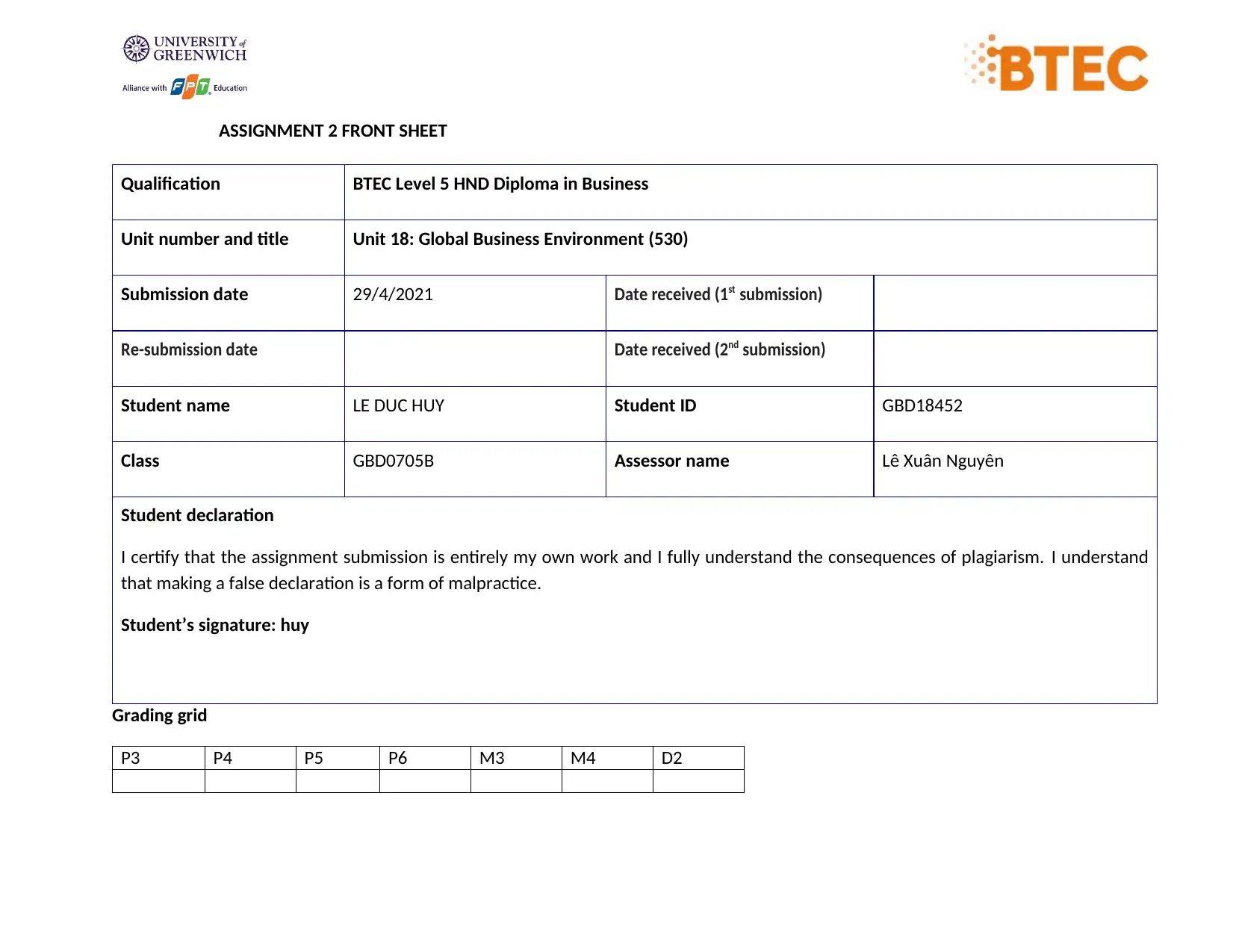
ASSIGNMENT 2 FRONT SHEET
Qualification BTEC Level 5 HND Diploma in Business
Unit number and title Unit 18: Global Business Environment (530)
Submission date 29/4/2021 Date received (1 st submission)
Re-submission date Date received (2 nd submission)
Student name LE DUC HUY Student ID GBD18452
Class GBD0705B Assessor name Lê Xuân Nguyên
Student declaration
I certify that the assignment submission is entirely my own work and I fully understand the consequences of plagiarism. I understand
that making a false declaration is a form of malpractice.
Student’s signature: huy
Grading grid
P3 P4 P5 P6 M3 M4 D2
Qualification BTEC Level 5 HND Diploma in Business
Unit number and title Unit 18: Global Business Environment (530)
Submission date 29/4/2021 Date received (1 st submission)
Re-submission date Date received (2 nd submission)
Student name LE DUC HUY Student ID GBD18452
Class GBD0705B Assessor name Lê Xuân Nguyên
Student declaration
I certify that the assignment submission is entirely my own work and I fully understand the consequences of plagiarism. I understand
that making a false declaration is a form of malpractice.
Student’s signature: huy
Grading grid
P3 P4 P5 P6 M3 M4 D2
Paraphrase This Document
Need a fresh take? Get an instant paraphrase of this document with our AI Paraphraser
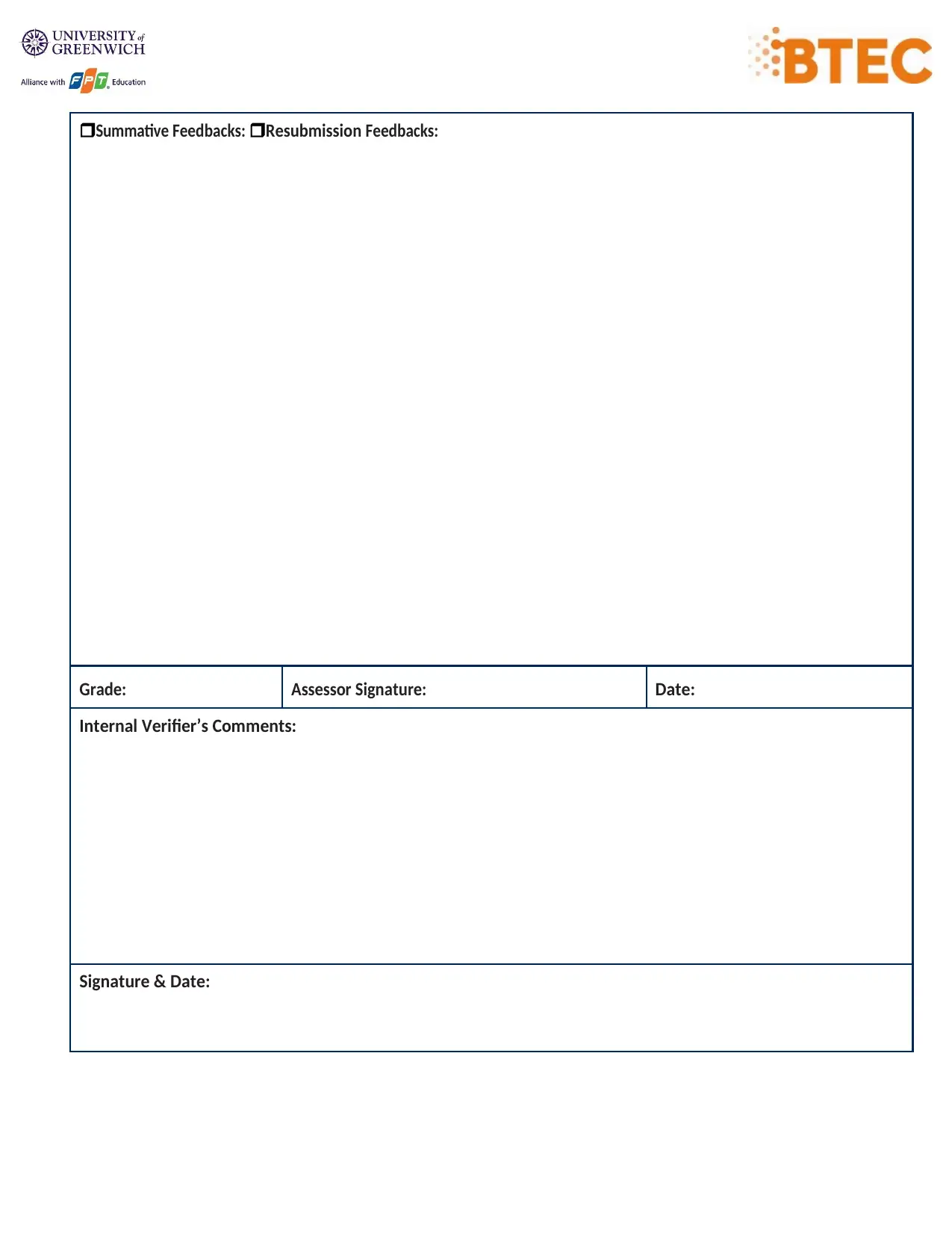
Summative Feedbacks: Resubmission Feedbacks:
Grade: Assessor Signature: Date:
Internal Verifier’s Comments:
Signature & Date:
Grade: Assessor Signature: Date:
Internal Verifier’s Comments:
Signature & Date:
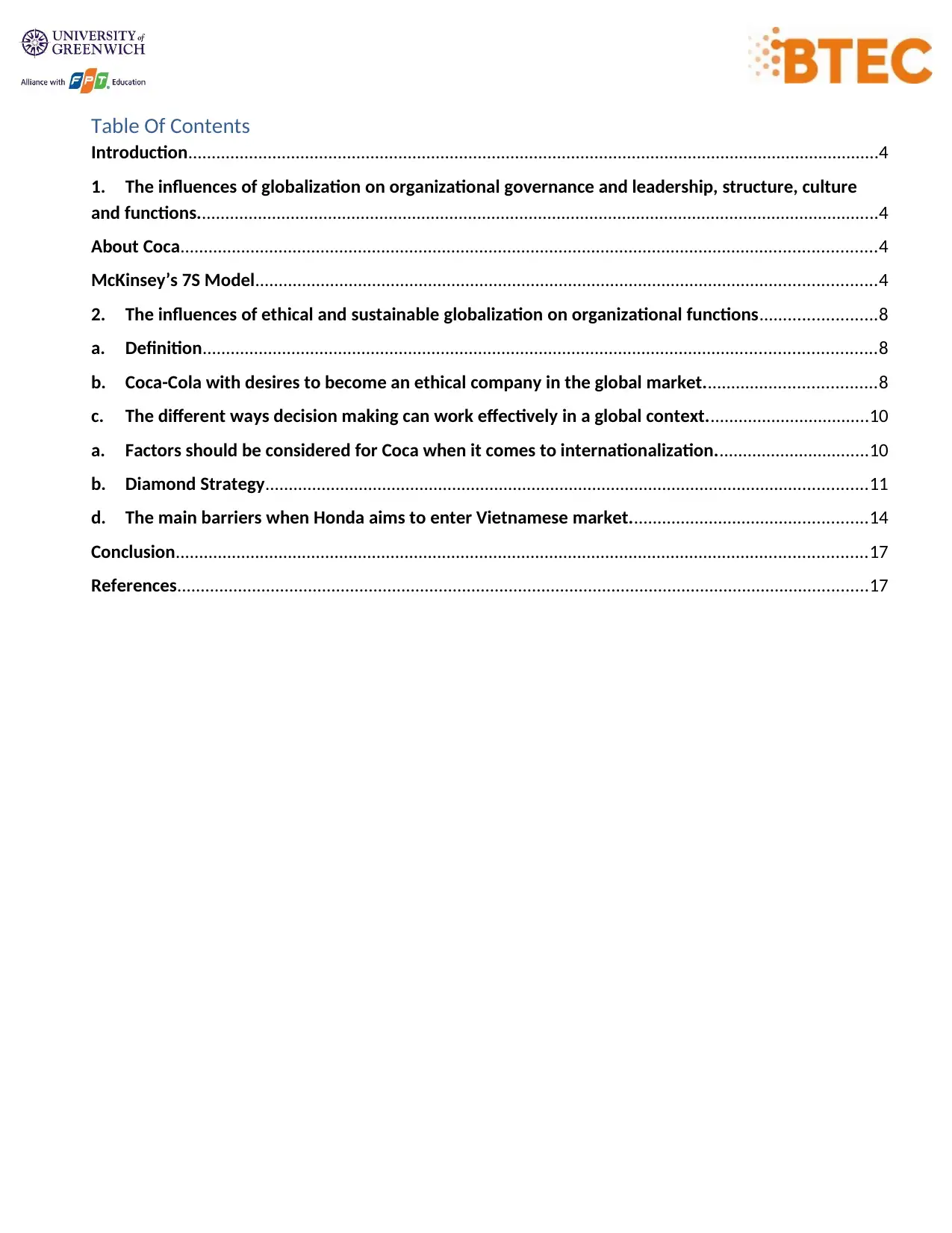
Table Of Contents
Introduction....................................................................................................................................................4
1. The influences of globalization on organizational governance and leadership, structure, culture
and functions..................................................................................................................................................4
About Coca.....................................................................................................................................................4
McKinsey’s 7S Model.....................................................................................................................................4
2. The influences of ethical and sustainable globalization on organizational functions.........................8
a. Definition................................................................................................................................................8
b. Coca-Cola with desires to become an ethical company in the global market.....................................8
c. The different ways decision making can work effectively in a global context...................................10
a. Factors should be considered for Coca when it comes to internationalization.................................10
b. Diamond Strategy.................................................................................................................................11
d. The main barriers when Honda aims to enter Vietnamese market...................................................14
Conclusion....................................................................................................................................................17
References....................................................................................................................................................17
Introduction....................................................................................................................................................4
1. The influences of globalization on organizational governance and leadership, structure, culture
and functions..................................................................................................................................................4
About Coca.....................................................................................................................................................4
McKinsey’s 7S Model.....................................................................................................................................4
2. The influences of ethical and sustainable globalization on organizational functions.........................8
a. Definition................................................................................................................................................8
b. Coca-Cola with desires to become an ethical company in the global market.....................................8
c. The different ways decision making can work effectively in a global context...................................10
a. Factors should be considered for Coca when it comes to internationalization.................................10
b. Diamond Strategy.................................................................................................................................11
d. The main barriers when Honda aims to enter Vietnamese market...................................................14
Conclusion....................................................................................................................................................17
References....................................................................................................................................................17
⊘ This is a preview!⊘
Do you want full access?
Subscribe today to unlock all pages.

Trusted by 1+ million students worldwide
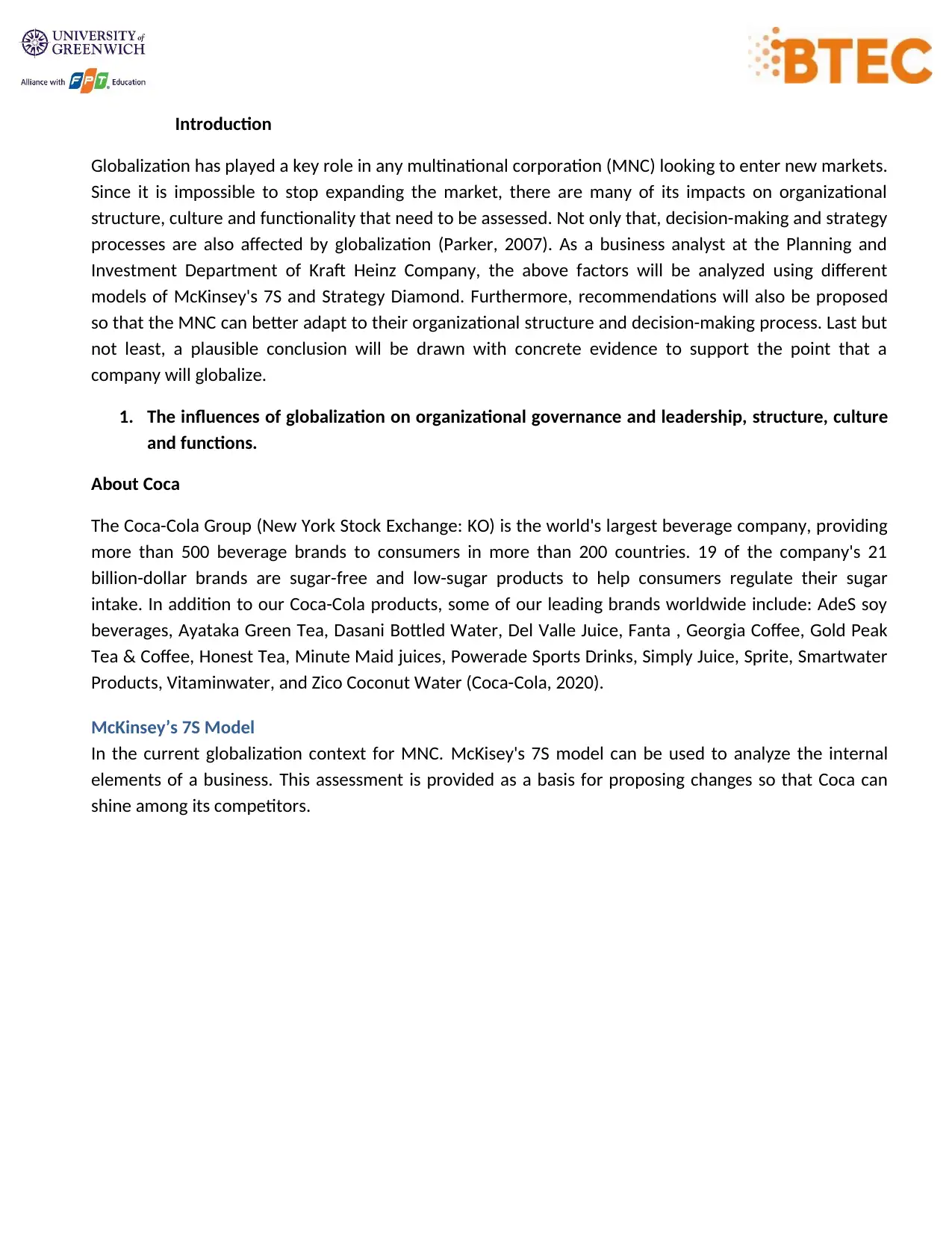
Introduction
Globalization has played a key role in any multinational corporation (MNC) looking to enter new markets.
Since it is impossible to stop expanding the market, there are many of its impacts on organizational
structure, culture and functionality that need to be assessed. Not only that, decision-making and strategy
processes are also affected by globalization (Parker, 2007). As a business analyst at the Planning and
Investment Department of Kraft Heinz Company, the above factors will be analyzed using different
models of McKinsey's 7S and Strategy Diamond. Furthermore, recommendations will also be proposed
so that the MNC can better adapt to their organizational structure and decision-making process. Last but
not least, a plausible conclusion will be drawn with concrete evidence to support the point that a
company will globalize.
1. The influences of globalization on organizational governance and leadership, structure, culture
and functions.
About Coca
The Coca-Cola Group (New York Stock Exchange: KO) is the world's largest beverage company, providing
more than 500 beverage brands to consumers in more than 200 countries. 19 of the company's 21
billion-dollar brands are sugar-free and low-sugar products to help consumers regulate their sugar
intake. In addition to our Coca-Cola products, some of our leading brands worldwide include: AdeS soy
beverages, Ayataka Green Tea, Dasani Bottled Water, Del Valle Juice, Fanta , Georgia Coffee, Gold Peak
Tea & Coffee, Honest Tea, Minute Maid juices, Powerade Sports Drinks, Simply Juice, Sprite, Smartwater
Products, Vitaminwater, and Zico Coconut Water (Coca-Cola, 2020).
McKinsey’s 7S Model
In the current globalization context for MNC. McKisey's 7S model can be used to analyze the internal
elements of a business. This assessment is provided as a basis for proposing changes so that Coca can
shine among its competitors.
Globalization has played a key role in any multinational corporation (MNC) looking to enter new markets.
Since it is impossible to stop expanding the market, there are many of its impacts on organizational
structure, culture and functionality that need to be assessed. Not only that, decision-making and strategy
processes are also affected by globalization (Parker, 2007). As a business analyst at the Planning and
Investment Department of Kraft Heinz Company, the above factors will be analyzed using different
models of McKinsey's 7S and Strategy Diamond. Furthermore, recommendations will also be proposed
so that the MNC can better adapt to their organizational structure and decision-making process. Last but
not least, a plausible conclusion will be drawn with concrete evidence to support the point that a
company will globalize.
1. The influences of globalization on organizational governance and leadership, structure, culture
and functions.
About Coca
The Coca-Cola Group (New York Stock Exchange: KO) is the world's largest beverage company, providing
more than 500 beverage brands to consumers in more than 200 countries. 19 of the company's 21
billion-dollar brands are sugar-free and low-sugar products to help consumers regulate their sugar
intake. In addition to our Coca-Cola products, some of our leading brands worldwide include: AdeS soy
beverages, Ayataka Green Tea, Dasani Bottled Water, Del Valle Juice, Fanta , Georgia Coffee, Gold Peak
Tea & Coffee, Honest Tea, Minute Maid juices, Powerade Sports Drinks, Simply Juice, Sprite, Smartwater
Products, Vitaminwater, and Zico Coconut Water (Coca-Cola, 2020).
McKinsey’s 7S Model
In the current globalization context for MNC. McKisey's 7S model can be used to analyze the internal
elements of a business. This assessment is provided as a basis for proposing changes so that Coca can
shine among its competitors.
Paraphrase This Document
Need a fresh take? Get an instant paraphrase of this document with our AI Paraphraser
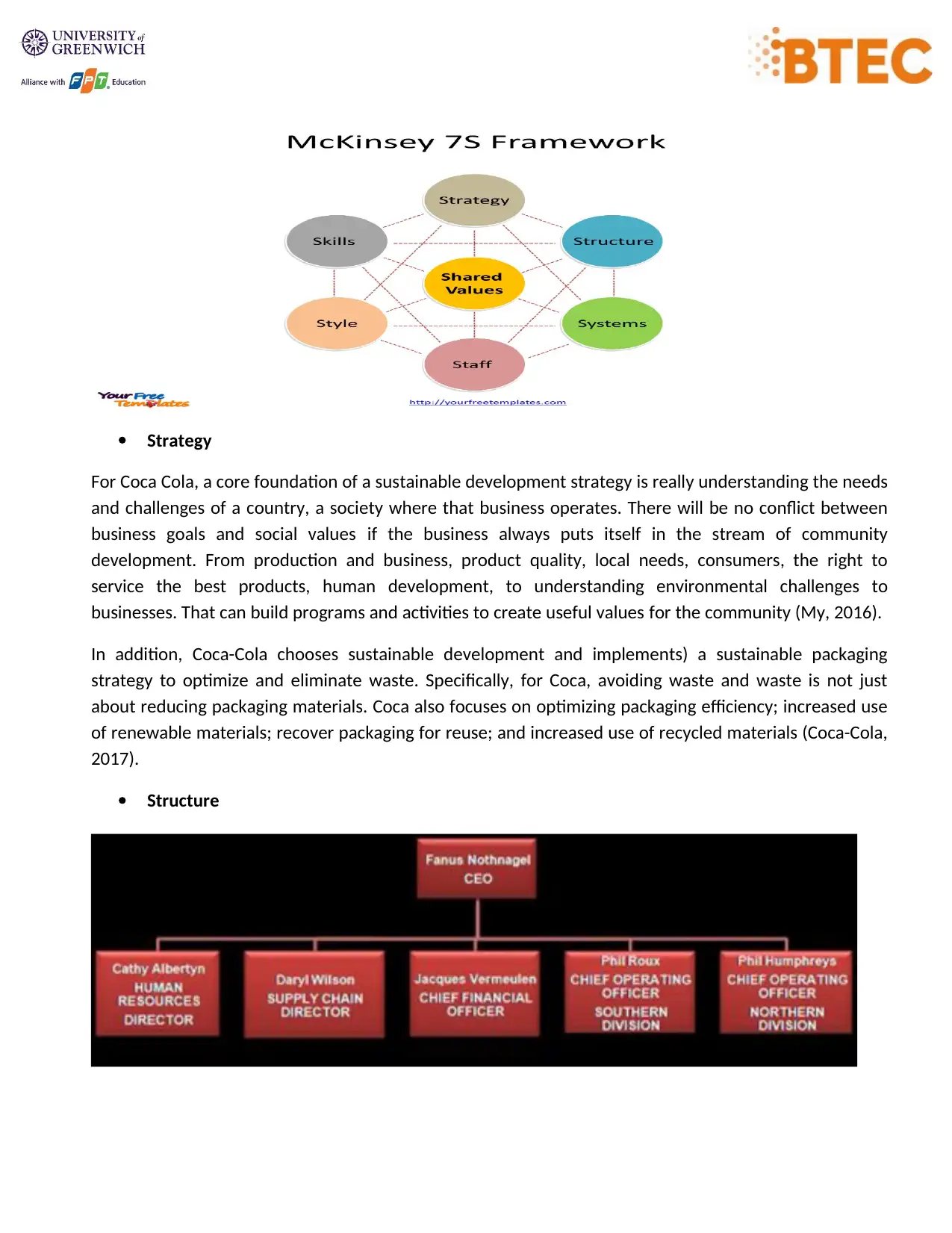
Strategy
For Coca Cola, a core foundation of a sustainable development strategy is really understanding the needs
and challenges of a country, a society where that business operates. There will be no conflict between
business goals and social values if the business always puts itself in the stream of community
development. From production and business, product quality, local needs, consumers, the right to
service the best products, human development, to understanding environmental challenges to
businesses. That can build programs and activities to create useful values for the community (My, 2016).
In addition, Coca-Cola chooses sustainable development and implements) a sustainable packaging
strategy to optimize and eliminate waste. Specifically, for Coca, avoiding waste and waste is not just
about reducing packaging materials. Coca also focuses on optimizing packaging efficiency; increased use
of renewable materials; recover packaging for reuse; and increased use of recycled materials (Coca-Cola,
2017).
Structure
For Coca Cola, a core foundation of a sustainable development strategy is really understanding the needs
and challenges of a country, a society where that business operates. There will be no conflict between
business goals and social values if the business always puts itself in the stream of community
development. From production and business, product quality, local needs, consumers, the right to
service the best products, human development, to understanding environmental challenges to
businesses. That can build programs and activities to create useful values for the community (My, 2016).
In addition, Coca-Cola chooses sustainable development and implements) a sustainable packaging
strategy to optimize and eliminate waste. Specifically, for Coca, avoiding waste and waste is not just
about reducing packaging materials. Coca also focuses on optimizing packaging efficiency; increased use
of renewable materials; recover packaging for reuse; and increased use of recycled materials (Coca-Cola,
2017).
Structure
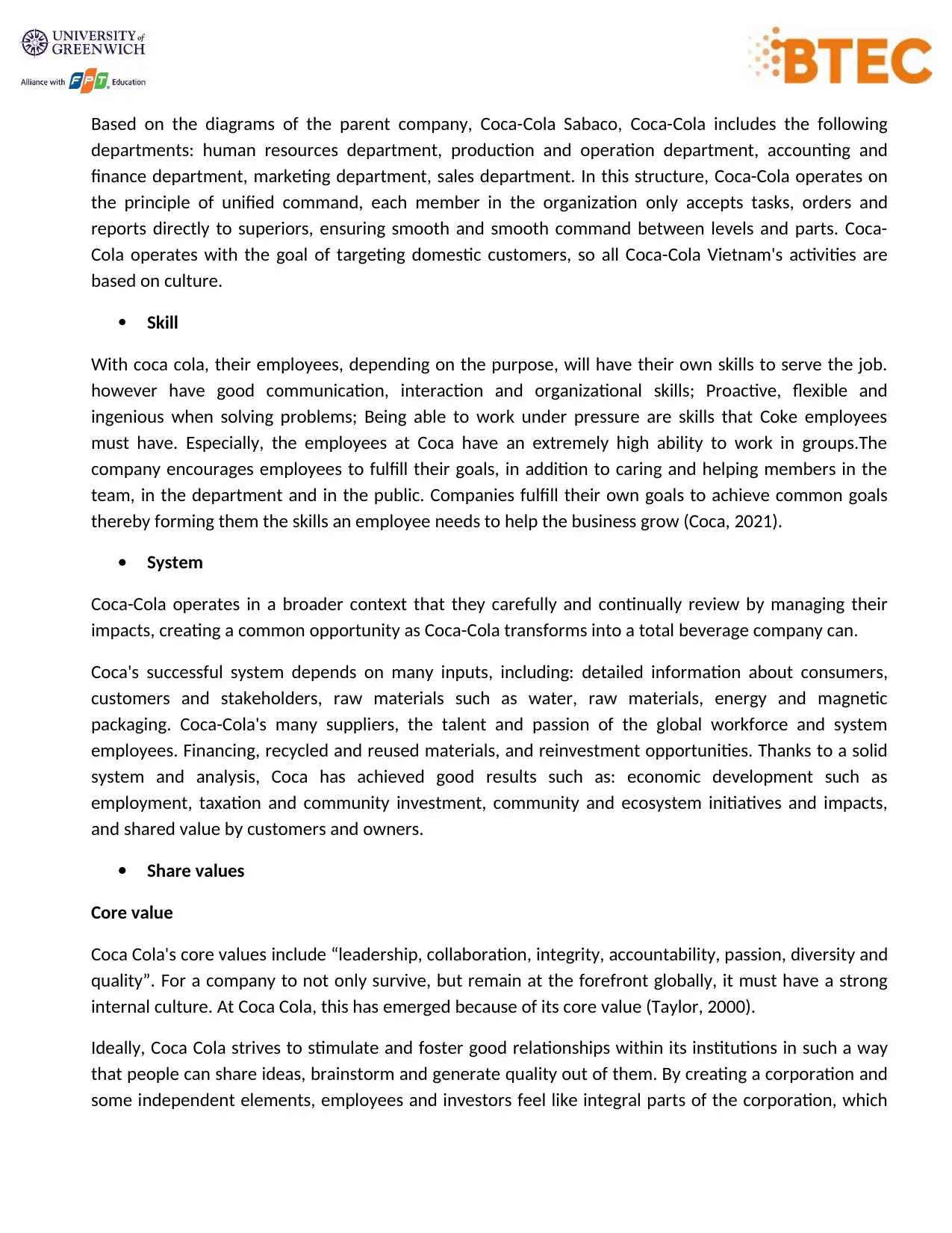
Based on the diagrams of the parent company, Coca-Cola Sabaco, Coca-Cola includes the following
departments: human resources department, production and operation department, accounting and
finance department, marketing department, sales department. In this structure, Coca-Cola operates on
the principle of unified command, each member in the organization only accepts tasks, orders and
reports directly to superiors, ensuring smooth and smooth command between levels and parts. Coca-
Cola operates with the goal of targeting domestic customers, so all Coca-Cola Vietnam's activities are
based on culture.
Skill
With coca cola, their employees, depending on the purpose, will have their own skills to serve the job.
however have good communication, interaction and organizational skills; Proactive, flexible and
ingenious when solving problems; Being able to work under pressure are skills that Coke employees
must have. Especially, the employees at Coca have an extremely high ability to work in groups.The
company encourages employees to fulfill their goals, in addition to caring and helping members in the
team, in the department and in the public. Companies fulfill their own goals to achieve common goals
thereby forming them the skills an employee needs to help the business grow (Coca, 2021).
System
Coca-Cola operates in a broader context that they carefully and continually review by managing their
impacts, creating a common opportunity as Coca-Cola transforms into a total beverage company can.
Coca's successful system depends on many inputs, including: detailed information about consumers,
customers and stakeholders, raw materials such as water, raw materials, energy and magnetic
packaging. Coca-Cola's many suppliers, the talent and passion of the global workforce and system
employees. Financing, recycled and reused materials, and reinvestment opportunities. Thanks to a solid
system and analysis, Coca has achieved good results such as: economic development such as
employment, taxation and community investment, community and ecosystem initiatives and impacts,
and shared value by customers and owners.
Share values
Core value
Coca Cola's core values include “leadership, collaboration, integrity, accountability, passion, diversity and
quality”. For a company to not only survive, but remain at the forefront globally, it must have a strong
internal culture. At Coca Cola, this has emerged because of its core value (Taylor, 2000).
Ideally, Coca Cola strives to stimulate and foster good relationships within its institutions in such a way
that people can share ideas, brainstorm and generate quality out of them. By creating a corporation and
some independent elements, employees and investors feel like integral parts of the corporation, which
departments: human resources department, production and operation department, accounting and
finance department, marketing department, sales department. In this structure, Coca-Cola operates on
the principle of unified command, each member in the organization only accepts tasks, orders and
reports directly to superiors, ensuring smooth and smooth command between levels and parts. Coca-
Cola operates with the goal of targeting domestic customers, so all Coca-Cola Vietnam's activities are
based on culture.
Skill
With coca cola, their employees, depending on the purpose, will have their own skills to serve the job.
however have good communication, interaction and organizational skills; Proactive, flexible and
ingenious when solving problems; Being able to work under pressure are skills that Coke employees
must have. Especially, the employees at Coca have an extremely high ability to work in groups.The
company encourages employees to fulfill their goals, in addition to caring and helping members in the
team, in the department and in the public. Companies fulfill their own goals to achieve common goals
thereby forming them the skills an employee needs to help the business grow (Coca, 2021).
System
Coca-Cola operates in a broader context that they carefully and continually review by managing their
impacts, creating a common opportunity as Coca-Cola transforms into a total beverage company can.
Coca's successful system depends on many inputs, including: detailed information about consumers,
customers and stakeholders, raw materials such as water, raw materials, energy and magnetic
packaging. Coca-Cola's many suppliers, the talent and passion of the global workforce and system
employees. Financing, recycled and reused materials, and reinvestment opportunities. Thanks to a solid
system and analysis, Coca has achieved good results such as: economic development such as
employment, taxation and community investment, community and ecosystem initiatives and impacts,
and shared value by customers and owners.
Share values
Core value
Coca Cola's core values include “leadership, collaboration, integrity, accountability, passion, diversity and
quality”. For a company to not only survive, but remain at the forefront globally, it must have a strong
internal culture. At Coca Cola, this has emerged because of its core value (Taylor, 2000).
Ideally, Coca Cola strives to stimulate and foster good relationships within its institutions in such a way
that people can share ideas, brainstorm and generate quality out of them. By creating a corporation and
some independent elements, employees and investors feel like integral parts of the corporation, which
⊘ This is a preview!⊘
Do you want full access?
Subscribe today to unlock all pages.

Trusted by 1+ million students worldwide
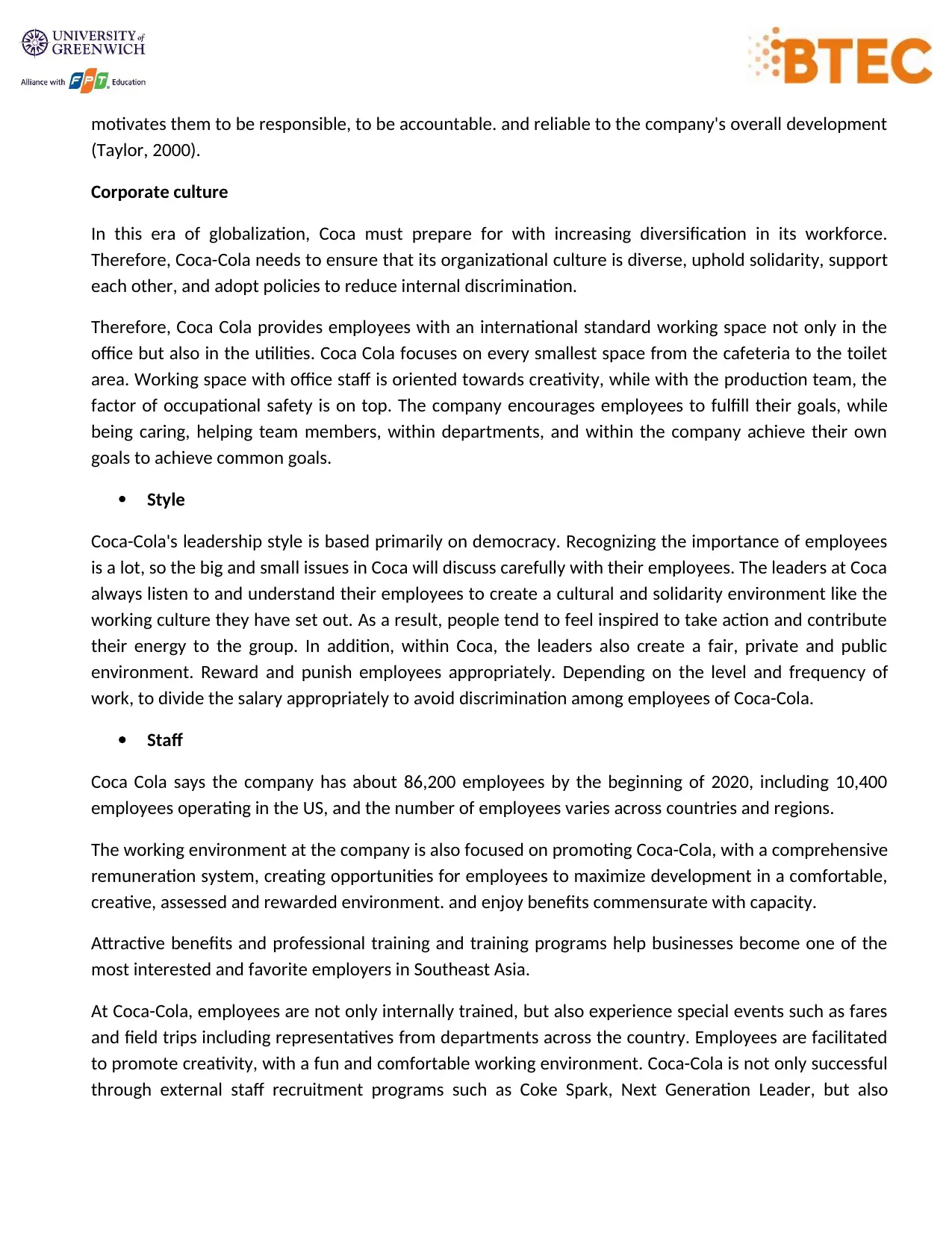
motivates them to be responsible, to be accountable. and reliable to the company's overall development
(Taylor, 2000).
Corporate culture
In this era of globalization, Coca must prepare for with increasing diversification in its workforce.
Therefore, Coca-Cola needs to ensure that its organizational culture is diverse, uphold solidarity, support
each other, and adopt policies to reduce internal discrimination.
Therefore, Coca Cola provides employees with an international standard working space not only in the
office but also in the utilities. Coca Cola focuses on every smallest space from the cafeteria to the toilet
area. Working space with office staff is oriented towards creativity, while with the production team, the
factor of occupational safety is on top. The company encourages employees to fulfill their goals, while
being caring, helping team members, within departments, and within the company achieve their own
goals to achieve common goals.
Style
Coca-Cola's leadership style is based primarily on democracy. Recognizing the importance of employees
is a lot, so the big and small issues in Coca will discuss carefully with their employees. The leaders at Coca
always listen to and understand their employees to create a cultural and solidarity environment like the
working culture they have set out. As a result, people tend to feel inspired to take action and contribute
their energy to the group. In addition, within Coca, the leaders also create a fair, private and public
environment. Reward and punish employees appropriately. Depending on the level and frequency of
work, to divide the salary appropriately to avoid discrimination among employees of Coca-Cola.
Staff
Coca Cola says the company has about 86,200 employees by the beginning of 2020, including 10,400
employees operating in the US, and the number of employees varies across countries and regions.
The working environment at the company is also focused on promoting Coca-Cola, with a comprehensive
remuneration system, creating opportunities for employees to maximize development in a comfortable,
creative, assessed and rewarded environment. and enjoy benefits commensurate with capacity.
Attractive benefits and professional training and training programs help businesses become one of the
most interested and favorite employers in Southeast Asia.
At Coca-Cola, employees are not only internally trained, but also experience special events such as fares
and field trips including representatives from departments across the country. Employees are facilitated
to promote creativity, with a fun and comfortable working environment. Coca-Cola is not only successful
through external staff recruitment programs such as Coke Spark, Next Generation Leader, but also
(Taylor, 2000).
Corporate culture
In this era of globalization, Coca must prepare for with increasing diversification in its workforce.
Therefore, Coca-Cola needs to ensure that its organizational culture is diverse, uphold solidarity, support
each other, and adopt policies to reduce internal discrimination.
Therefore, Coca Cola provides employees with an international standard working space not only in the
office but also in the utilities. Coca Cola focuses on every smallest space from the cafeteria to the toilet
area. Working space with office staff is oriented towards creativity, while with the production team, the
factor of occupational safety is on top. The company encourages employees to fulfill their goals, while
being caring, helping team members, within departments, and within the company achieve their own
goals to achieve common goals.
Style
Coca-Cola's leadership style is based primarily on democracy. Recognizing the importance of employees
is a lot, so the big and small issues in Coca will discuss carefully with their employees. The leaders at Coca
always listen to and understand their employees to create a cultural and solidarity environment like the
working culture they have set out. As a result, people tend to feel inspired to take action and contribute
their energy to the group. In addition, within Coca, the leaders also create a fair, private and public
environment. Reward and punish employees appropriately. Depending on the level and frequency of
work, to divide the salary appropriately to avoid discrimination among employees of Coca-Cola.
Staff
Coca Cola says the company has about 86,200 employees by the beginning of 2020, including 10,400
employees operating in the US, and the number of employees varies across countries and regions.
The working environment at the company is also focused on promoting Coca-Cola, with a comprehensive
remuneration system, creating opportunities for employees to maximize development in a comfortable,
creative, assessed and rewarded environment. and enjoy benefits commensurate with capacity.
Attractive benefits and professional training and training programs help businesses become one of the
most interested and favorite employers in Southeast Asia.
At Coca-Cola, employees are not only internally trained, but also experience special events such as fares
and field trips including representatives from departments across the country. Employees are facilitated
to promote creativity, with a fun and comfortable working environment. Coca-Cola is not only successful
through external staff recruitment programs such as Coke Spark, Next Generation Leader, but also
Paraphrase This Document
Need a fresh take? Get an instant paraphrase of this document with our AI Paraphraser
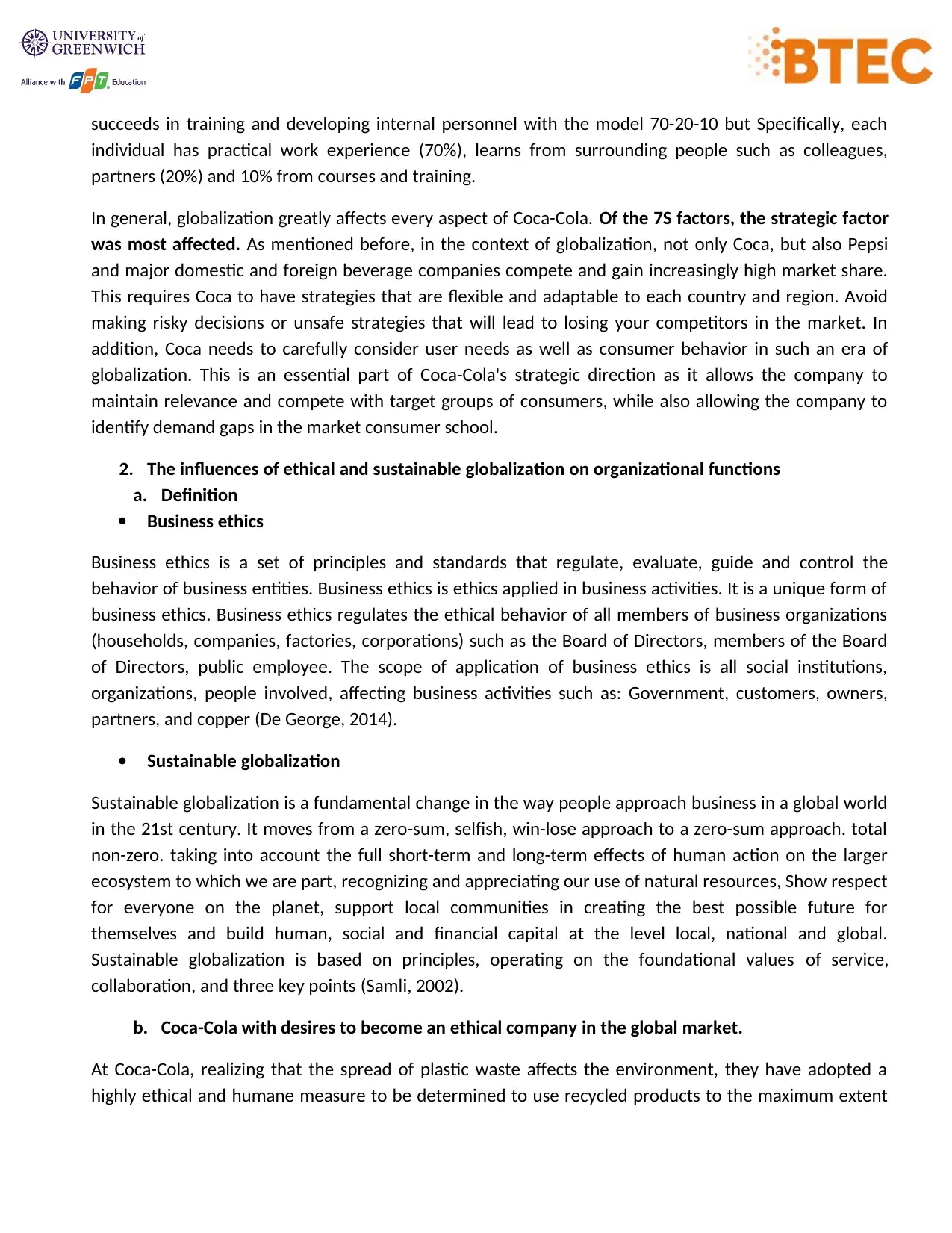
succeeds in training and developing internal personnel with the model 70-20-10 but Specifically, each
individual has practical work experience (70%), learns from surrounding people such as colleagues,
partners (20%) and 10% from courses and training.
In general, globalization greatly affects every aspect of Coca-Cola. Of the 7S factors, the strategic factor
was most affected. As mentioned before, in the context of globalization, not only Coca, but also Pepsi
and major domestic and foreign beverage companies compete and gain increasingly high market share.
This requires Coca to have strategies that are flexible and adaptable to each country and region. Avoid
making risky decisions or unsafe strategies that will lead to losing your competitors in the market. In
addition, Coca needs to carefully consider user needs as well as consumer behavior in such an era of
globalization. This is an essential part of Coca-Cola's strategic direction as it allows the company to
maintain relevance and compete with target groups of consumers, while also allowing the company to
identify demand gaps in the market consumer school.
2. The influences of ethical and sustainable globalization on organizational functions
a. Definition
Business ethics
Business ethics is a set of principles and standards that regulate, evaluate, guide and control the
behavior of business entities. Business ethics is ethics applied in business activities. It is a unique form of
business ethics. Business ethics regulates the ethical behavior of all members of business organizations
(households, companies, factories, corporations) such as the Board of Directors, members of the Board
of Directors, public employee. The scope of application of business ethics is all social institutions,
organizations, people involved, affecting business activities such as: Government, customers, owners,
partners, and copper (De George, 2014).
Sustainable globalization
Sustainable globalization is a fundamental change in the way people approach business in a global world
in the 21st century. It moves from a zero-sum, selfish, win-lose approach to a zero-sum approach. total
non-zero. taking into account the full short-term and long-term effects of human action on the larger
ecosystem to which we are part, recognizing and appreciating our use of natural resources, Show respect
for everyone on the planet, support local communities in creating the best possible future for
themselves and build human, social and financial capital at the level local, national and global.
Sustainable globalization is based on principles, operating on the foundational values of service,
collaboration, and three key points (Samli, 2002).
b. Coca-Cola with desires to become an ethical company in the global market.
At Coca-Cola, realizing that the spread of plastic waste affects the environment, they have adopted a
highly ethical and humane measure to be determined to use recycled products to the maximum extent
individual has practical work experience (70%), learns from surrounding people such as colleagues,
partners (20%) and 10% from courses and training.
In general, globalization greatly affects every aspect of Coca-Cola. Of the 7S factors, the strategic factor
was most affected. As mentioned before, in the context of globalization, not only Coca, but also Pepsi
and major domestic and foreign beverage companies compete and gain increasingly high market share.
This requires Coca to have strategies that are flexible and adaptable to each country and region. Avoid
making risky decisions or unsafe strategies that will lead to losing your competitors in the market. In
addition, Coca needs to carefully consider user needs as well as consumer behavior in such an era of
globalization. This is an essential part of Coca-Cola's strategic direction as it allows the company to
maintain relevance and compete with target groups of consumers, while also allowing the company to
identify demand gaps in the market consumer school.
2. The influences of ethical and sustainable globalization on organizational functions
a. Definition
Business ethics
Business ethics is a set of principles and standards that regulate, evaluate, guide and control the
behavior of business entities. Business ethics is ethics applied in business activities. It is a unique form of
business ethics. Business ethics regulates the ethical behavior of all members of business organizations
(households, companies, factories, corporations) such as the Board of Directors, members of the Board
of Directors, public employee. The scope of application of business ethics is all social institutions,
organizations, people involved, affecting business activities such as: Government, customers, owners,
partners, and copper (De George, 2014).
Sustainable globalization
Sustainable globalization is a fundamental change in the way people approach business in a global world
in the 21st century. It moves from a zero-sum, selfish, win-lose approach to a zero-sum approach. total
non-zero. taking into account the full short-term and long-term effects of human action on the larger
ecosystem to which we are part, recognizing and appreciating our use of natural resources, Show respect
for everyone on the planet, support local communities in creating the best possible future for
themselves and build human, social and financial capital at the level local, national and global.
Sustainable globalization is based on principles, operating on the foundational values of service,
collaboration, and three key points (Samli, 2002).
b. Coca-Cola with desires to become an ethical company in the global market.
At Coca-Cola, realizing that the spread of plastic waste affects the environment, they have adopted a
highly ethical and humane measure to be determined to use recycled products to the maximum extent
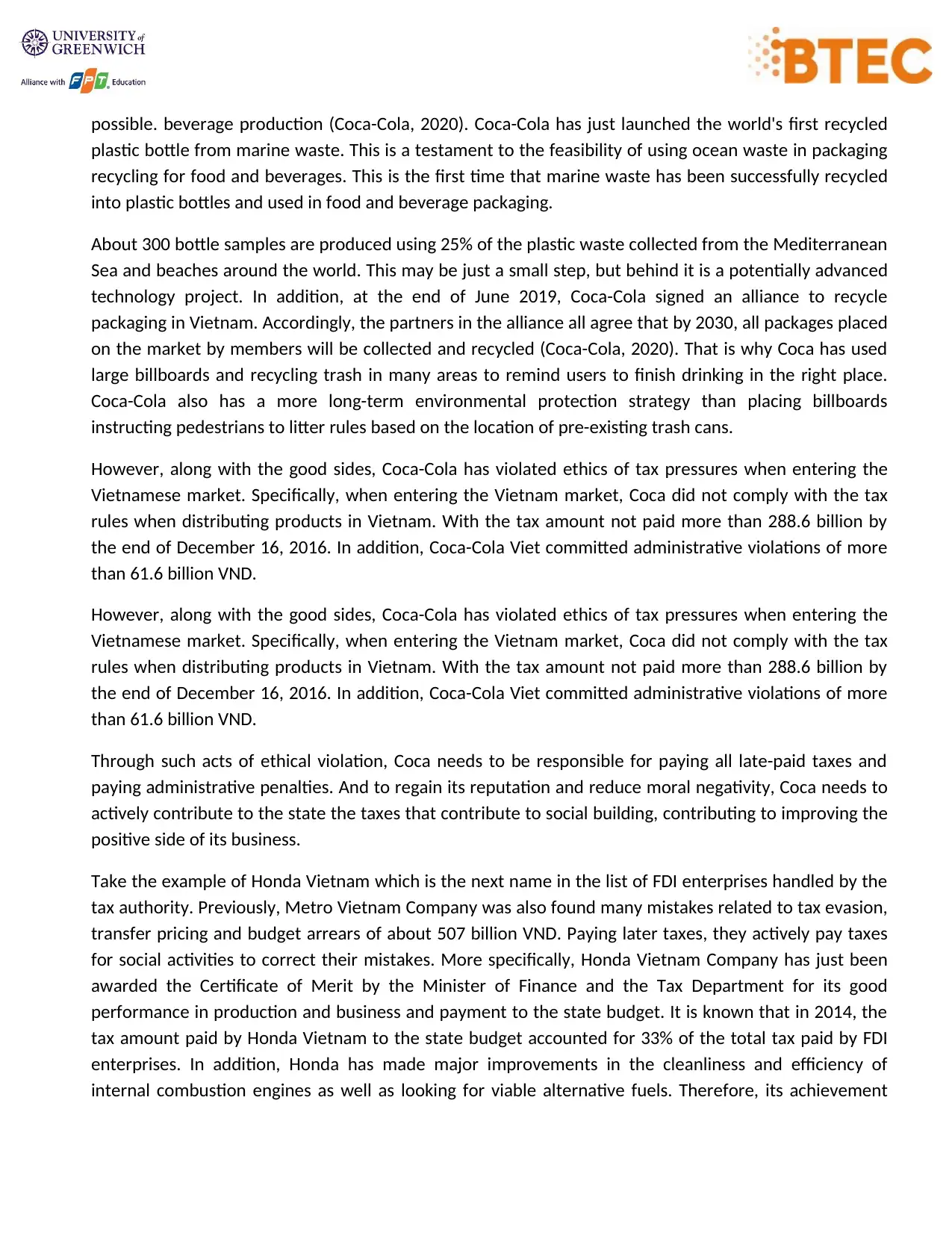
possible. beverage production (Coca-Cola, 2020). Coca-Cola has just launched the world's first recycled
plastic bottle from marine waste. This is a testament to the feasibility of using ocean waste in packaging
recycling for food and beverages. This is the first time that marine waste has been successfully recycled
into plastic bottles and used in food and beverage packaging.
About 300 bottle samples are produced using 25% of the plastic waste collected from the Mediterranean
Sea and beaches around the world. This may be just a small step, but behind it is a potentially advanced
technology project. In addition, at the end of June 2019, Coca-Cola signed an alliance to recycle
packaging in Vietnam. Accordingly, the partners in the alliance all agree that by 2030, all packages placed
on the market by members will be collected and recycled (Coca-Cola, 2020). That is why Coca has used
large billboards and recycling trash in many areas to remind users to finish drinking in the right place.
Coca-Cola also has a more long-term environmental protection strategy than placing billboards
instructing pedestrians to litter rules based on the location of pre-existing trash cans.
However, along with the good sides, Coca-Cola has violated ethics of tax pressures when entering the
Vietnamese market. Specifically, when entering the Vietnam market, Coca did not comply with the tax
rules when distributing products in Vietnam. With the tax amount not paid more than 288.6 billion by
the end of December 16, 2016. In addition, Coca-Cola Viet committed administrative violations of more
than 61.6 billion VND.
However, along with the good sides, Coca-Cola has violated ethics of tax pressures when entering the
Vietnamese market. Specifically, when entering the Vietnam market, Coca did not comply with the tax
rules when distributing products in Vietnam. With the tax amount not paid more than 288.6 billion by
the end of December 16, 2016. In addition, Coca-Cola Viet committed administrative violations of more
than 61.6 billion VND.
Through such acts of ethical violation, Coca needs to be responsible for paying all late-paid taxes and
paying administrative penalties. And to regain its reputation and reduce moral negativity, Coca needs to
actively contribute to the state the taxes that contribute to social building, contributing to improving the
positive side of its business.
Take the example of Honda Vietnam which is the next name in the list of FDI enterprises handled by the
tax authority. Previously, Metro Vietnam Company was also found many mistakes related to tax evasion,
transfer pricing and budget arrears of about 507 billion VND. Paying later taxes, they actively pay taxes
for social activities to correct their mistakes. More specifically, Honda Vietnam Company has just been
awarded the Certificate of Merit by the Minister of Finance and the Tax Department for its good
performance in production and business and payment to the state budget. It is known that in 2014, the
tax amount paid by Honda Vietnam to the state budget accounted for 33% of the total tax paid by FDI
enterprises. In addition, Honda has made major improvements in the cleanliness and efficiency of
internal combustion engines as well as looking for viable alternative fuels. Therefore, its achievement
plastic bottle from marine waste. This is a testament to the feasibility of using ocean waste in packaging
recycling for food and beverages. This is the first time that marine waste has been successfully recycled
into plastic bottles and used in food and beverage packaging.
About 300 bottle samples are produced using 25% of the plastic waste collected from the Mediterranean
Sea and beaches around the world. This may be just a small step, but behind it is a potentially advanced
technology project. In addition, at the end of June 2019, Coca-Cola signed an alliance to recycle
packaging in Vietnam. Accordingly, the partners in the alliance all agree that by 2030, all packages placed
on the market by members will be collected and recycled (Coca-Cola, 2020). That is why Coca has used
large billboards and recycling trash in many areas to remind users to finish drinking in the right place.
Coca-Cola also has a more long-term environmental protection strategy than placing billboards
instructing pedestrians to litter rules based on the location of pre-existing trash cans.
However, along with the good sides, Coca-Cola has violated ethics of tax pressures when entering the
Vietnamese market. Specifically, when entering the Vietnam market, Coca did not comply with the tax
rules when distributing products in Vietnam. With the tax amount not paid more than 288.6 billion by
the end of December 16, 2016. In addition, Coca-Cola Viet committed administrative violations of more
than 61.6 billion VND.
However, along with the good sides, Coca-Cola has violated ethics of tax pressures when entering the
Vietnamese market. Specifically, when entering the Vietnam market, Coca did not comply with the tax
rules when distributing products in Vietnam. With the tax amount not paid more than 288.6 billion by
the end of December 16, 2016. In addition, Coca-Cola Viet committed administrative violations of more
than 61.6 billion VND.
Through such acts of ethical violation, Coca needs to be responsible for paying all late-paid taxes and
paying administrative penalties. And to regain its reputation and reduce moral negativity, Coca needs to
actively contribute to the state the taxes that contribute to social building, contributing to improving the
positive side of its business.
Take the example of Honda Vietnam which is the next name in the list of FDI enterprises handled by the
tax authority. Previously, Metro Vietnam Company was also found many mistakes related to tax evasion,
transfer pricing and budget arrears of about 507 billion VND. Paying later taxes, they actively pay taxes
for social activities to correct their mistakes. More specifically, Honda Vietnam Company has just been
awarded the Certificate of Merit by the Minister of Finance and the Tax Department for its good
performance in production and business and payment to the state budget. It is known that in 2014, the
tax amount paid by Honda Vietnam to the state budget accounted for 33% of the total tax paid by FDI
enterprises. In addition, Honda has made major improvements in the cleanliness and efficiency of
internal combustion engines as well as looking for viable alternative fuels. Therefore, its achievement
⊘ This is a preview!⊘
Do you want full access?
Subscribe today to unlock all pages.

Trusted by 1+ million students worldwide
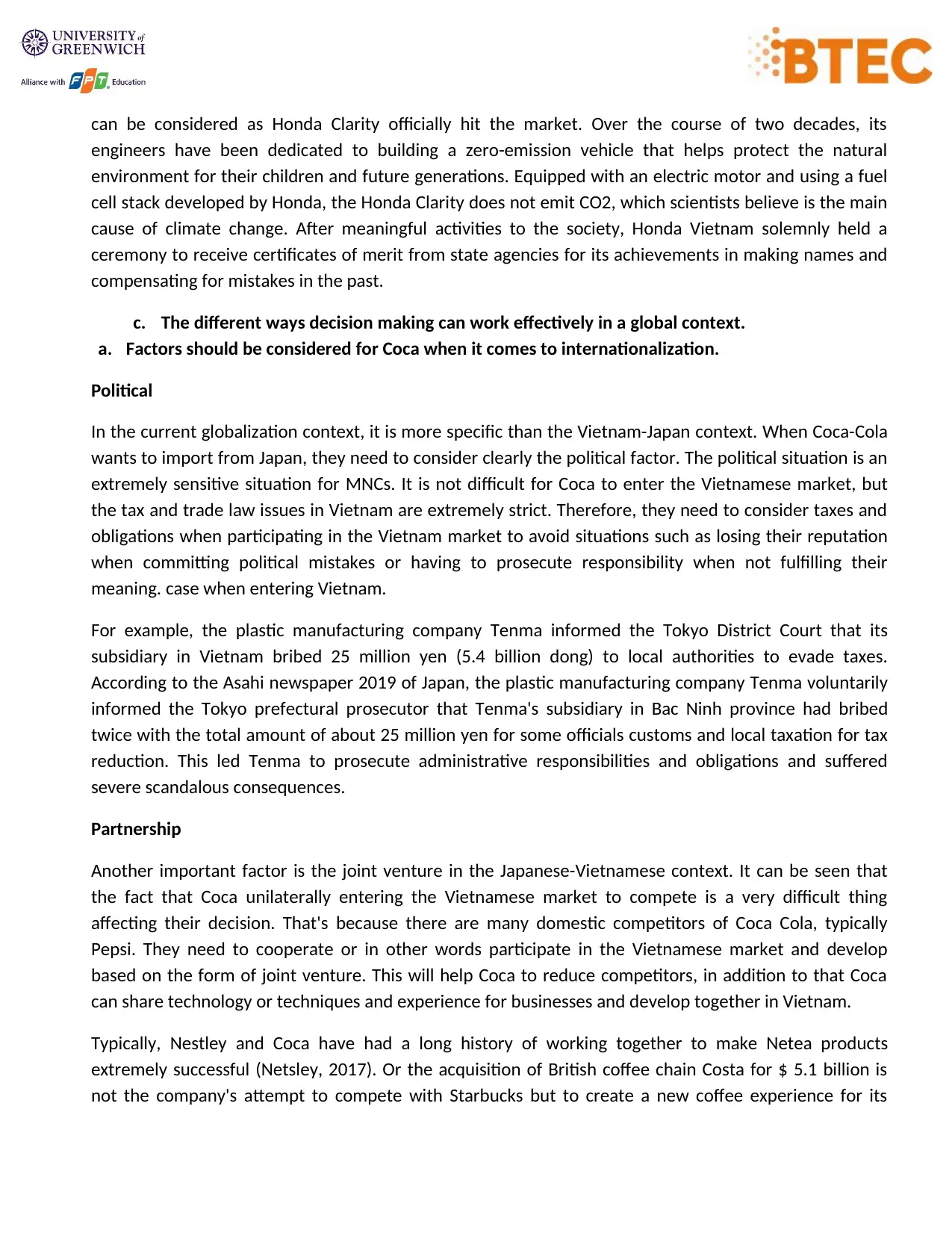
can be considered as Honda Clarity officially hit the market. Over the course of two decades, its
engineers have been dedicated to building a zero-emission vehicle that helps protect the natural
environment for their children and future generations. Equipped with an electric motor and using a fuel
cell stack developed by Honda, the Honda Clarity does not emit CO2, which scientists believe is the main
cause of climate change. After meaningful activities to the society, Honda Vietnam solemnly held a
ceremony to receive certificates of merit from state agencies for its achievements in making names and
compensating for mistakes in the past.
c. The different ways decision making can work effectively in a global context.
a. Factors should be considered for Coca when it comes to internationalization.
Political
In the current globalization context, it is more specific than the Vietnam-Japan context. When Coca-Cola
wants to import from Japan, they need to consider clearly the political factor. The political situation is an
extremely sensitive situation for MNCs. It is not difficult for Coca to enter the Vietnamese market, but
the tax and trade law issues in Vietnam are extremely strict. Therefore, they need to consider taxes and
obligations when participating in the Vietnam market to avoid situations such as losing their reputation
when committing political mistakes or having to prosecute responsibility when not fulfilling their
meaning. case when entering Vietnam.
For example, the plastic manufacturing company Tenma informed the Tokyo District Court that its
subsidiary in Vietnam bribed 25 million yen (5.4 billion dong) to local authorities to evade taxes.
According to the Asahi newspaper 2019 of Japan, the plastic manufacturing company Tenma voluntarily
informed the Tokyo prefectural prosecutor that Tenma's subsidiary in Bac Ninh province had bribed
twice with the total amount of about 25 million yen for some officials customs and local taxation for tax
reduction. This led Tenma to prosecute administrative responsibilities and obligations and suffered
severe scandalous consequences.
Partnership
Another important factor is the joint venture in the Japanese-Vietnamese context. It can be seen that
the fact that Coca unilaterally entering the Vietnamese market to compete is a very difficult thing
affecting their decision. That's because there are many domestic competitors of Coca Cola, typically
Pepsi. They need to cooperate or in other words participate in the Vietnamese market and develop
based on the form of joint venture. This will help Coca to reduce competitors, in addition to that Coca
can share technology or techniques and experience for businesses and develop together in Vietnam.
Typically, Nestley and Coca have had a long history of working together to make Netea products
extremely successful (Netsley, 2017). Or the acquisition of British coffee chain Costa for $ 5.1 billion is
not the company's attempt to compete with Starbucks but to create a new coffee experience for its
engineers have been dedicated to building a zero-emission vehicle that helps protect the natural
environment for their children and future generations. Equipped with an electric motor and using a fuel
cell stack developed by Honda, the Honda Clarity does not emit CO2, which scientists believe is the main
cause of climate change. After meaningful activities to the society, Honda Vietnam solemnly held a
ceremony to receive certificates of merit from state agencies for its achievements in making names and
compensating for mistakes in the past.
c. The different ways decision making can work effectively in a global context.
a. Factors should be considered for Coca when it comes to internationalization.
Political
In the current globalization context, it is more specific than the Vietnam-Japan context. When Coca-Cola
wants to import from Japan, they need to consider clearly the political factor. The political situation is an
extremely sensitive situation for MNCs. It is not difficult for Coca to enter the Vietnamese market, but
the tax and trade law issues in Vietnam are extremely strict. Therefore, they need to consider taxes and
obligations when participating in the Vietnam market to avoid situations such as losing their reputation
when committing political mistakes or having to prosecute responsibility when not fulfilling their
meaning. case when entering Vietnam.
For example, the plastic manufacturing company Tenma informed the Tokyo District Court that its
subsidiary in Vietnam bribed 25 million yen (5.4 billion dong) to local authorities to evade taxes.
According to the Asahi newspaper 2019 of Japan, the plastic manufacturing company Tenma voluntarily
informed the Tokyo prefectural prosecutor that Tenma's subsidiary in Bac Ninh province had bribed
twice with the total amount of about 25 million yen for some officials customs and local taxation for tax
reduction. This led Tenma to prosecute administrative responsibilities and obligations and suffered
severe scandalous consequences.
Partnership
Another important factor is the joint venture in the Japanese-Vietnamese context. It can be seen that
the fact that Coca unilaterally entering the Vietnamese market to compete is a very difficult thing
affecting their decision. That's because there are many domestic competitors of Coca Cola, typically
Pepsi. They need to cooperate or in other words participate in the Vietnamese market and develop
based on the form of joint venture. This will help Coca to reduce competitors, in addition to that Coca
can share technology or techniques and experience for businesses and develop together in Vietnam.
Typically, Nestley and Coca have had a long history of working together to make Netea products
extremely successful (Netsley, 2017). Or the acquisition of British coffee chain Costa for $ 5.1 billion is
not the company's attempt to compete with Starbucks but to create a new coffee experience for its
Paraphrase This Document
Need a fresh take? Get an instant paraphrase of this document with our AI Paraphraser
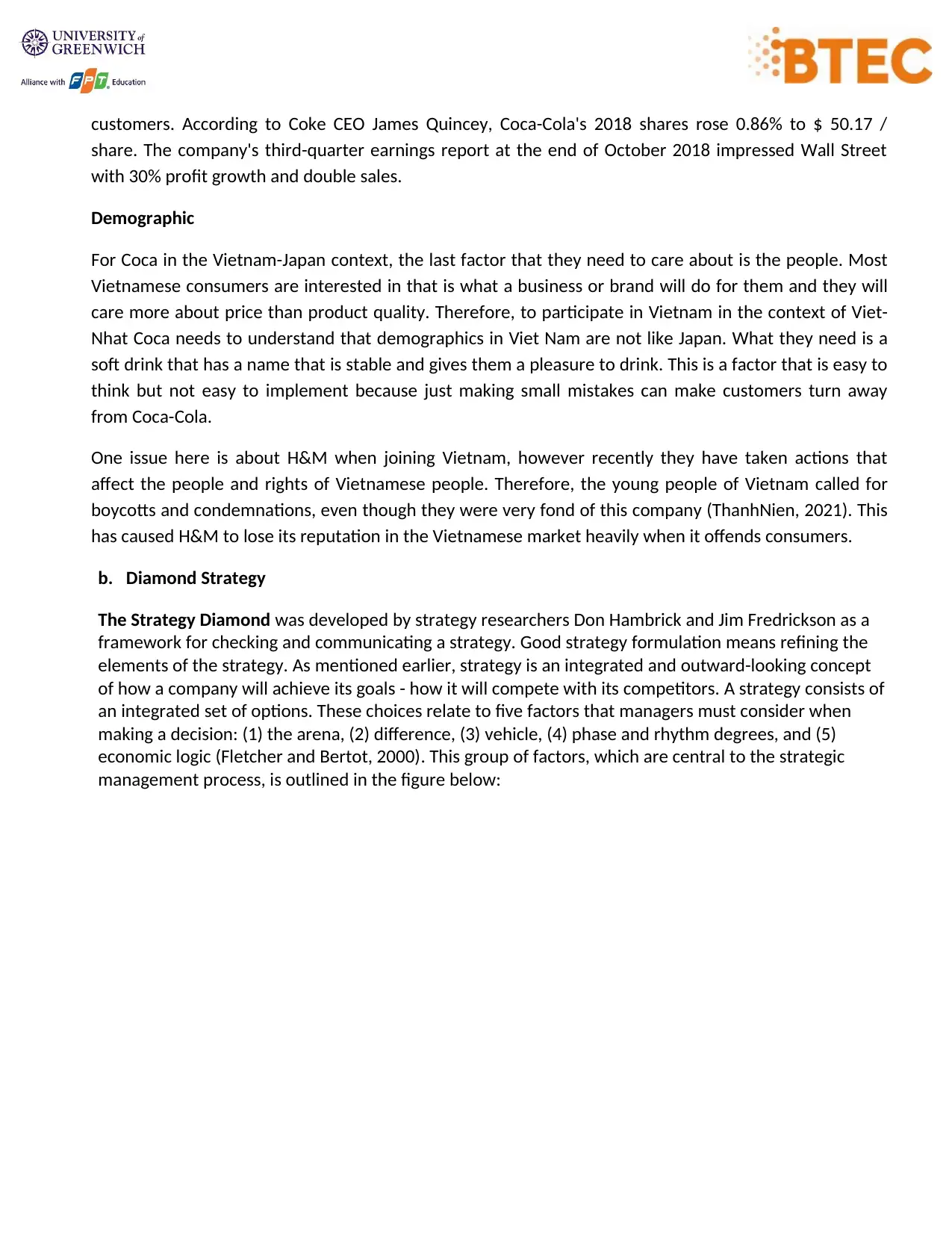
customers. According to Coke CEO James Quincey, Coca-Cola's 2018 shares rose 0.86% to $ 50.17 /
share. The company's third-quarter earnings report at the end of October 2018 impressed Wall Street
with 30% profit growth and double sales.
Demographic
For Coca in the Vietnam-Japan context, the last factor that they need to care about is the people. Most
Vietnamese consumers are interested in that is what a business or brand will do for them and they will
care more about price than product quality. Therefore, to participate in Vietnam in the context of Viet-
Nhat Coca needs to understand that demographics in Viet Nam are not like Japan. What they need is a
soft drink that has a name that is stable and gives them a pleasure to drink. This is a factor that is easy to
think but not easy to implement because just making small mistakes can make customers turn away
from Coca-Cola.
One issue here is about H&M when joining Vietnam, however recently they have taken actions that
affect the people and rights of Vietnamese people. Therefore, the young people of Vietnam called for
boycotts and condemnations, even though they were very fond of this company (ThanhNien, 2021). This
has caused H&M to lose its reputation in the Vietnamese market heavily when it offends consumers.
b. Diamond Strategy
The Strategy Diamond was developed by strategy researchers Don Hambrick and Jim Fredrickson as a
framework for checking and communicating a strategy. Good strategy formulation means refining the
elements of the strategy. As mentioned earlier, strategy is an integrated and outward-looking concept
of how a company will achieve its goals - how it will compete with its competitors. A strategy consists of
an integrated set of options. These choices relate to five factors that managers must consider when
making a decision: (1) the arena, (2) difference, (3) vehicle, (4) phase and rhythm degrees, and (5)
economic logic (Fletcher and Bertot, 2000). This group of factors, which are central to the strategic
management process, is outlined in the figure below:
share. The company's third-quarter earnings report at the end of October 2018 impressed Wall Street
with 30% profit growth and double sales.
Demographic
For Coca in the Vietnam-Japan context, the last factor that they need to care about is the people. Most
Vietnamese consumers are interested in that is what a business or brand will do for them and they will
care more about price than product quality. Therefore, to participate in Vietnam in the context of Viet-
Nhat Coca needs to understand that demographics in Viet Nam are not like Japan. What they need is a
soft drink that has a name that is stable and gives them a pleasure to drink. This is a factor that is easy to
think but not easy to implement because just making small mistakes can make customers turn away
from Coca-Cola.
One issue here is about H&M when joining Vietnam, however recently they have taken actions that
affect the people and rights of Vietnamese people. Therefore, the young people of Vietnam called for
boycotts and condemnations, even though they were very fond of this company (ThanhNien, 2021). This
has caused H&M to lose its reputation in the Vietnamese market heavily when it offends consumers.
b. Diamond Strategy
The Strategy Diamond was developed by strategy researchers Don Hambrick and Jim Fredrickson as a
framework for checking and communicating a strategy. Good strategy formulation means refining the
elements of the strategy. As mentioned earlier, strategy is an integrated and outward-looking concept
of how a company will achieve its goals - how it will compete with its competitors. A strategy consists of
an integrated set of options. These choices relate to five factors that managers must consider when
making a decision: (1) the arena, (2) difference, (3) vehicle, (4) phase and rhythm degrees, and (5)
economic logic (Fletcher and Bertot, 2000). This group of factors, which are central to the strategic
management process, is outlined in the figure below:
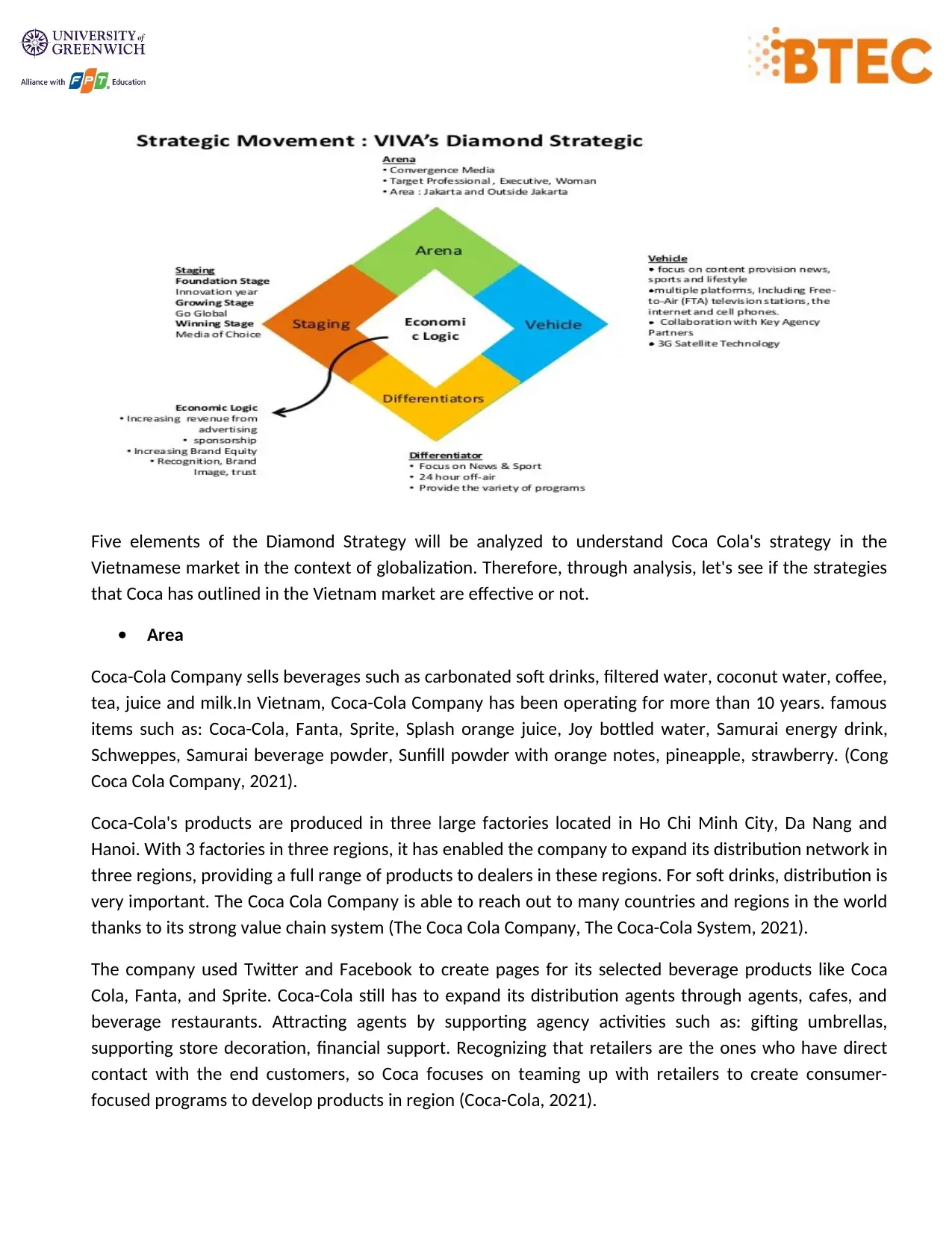
Five elements of the Diamond Strategy will be analyzed to understand Coca Cola's strategy in the
Vietnamese market in the context of globalization. Therefore, through analysis, let's see if the strategies
that Coca has outlined in the Vietnam market are effective or not.
Area
Coca-Cola Company sells beverages such as carbonated soft drinks, filtered water, coconut water, coffee,
tea, juice and milk.In Vietnam, Coca-Cola Company has been operating for more than 10 years. famous
items such as: Coca-Cola, Fanta, Sprite, Splash orange juice, Joy bottled water, Samurai energy drink,
Schweppes, Samurai beverage powder, Sunfill powder with orange notes, pineapple, strawberry. (Cong
Coca Cola Company, 2021).
Coca-Cola's products are produced in three large factories located in Ho Chi Minh City, Da Nang and
Hanoi. With 3 factories in three regions, it has enabled the company to expand its distribution network in
three regions, providing a full range of products to dealers in these regions. For soft drinks, distribution is
very important. The Coca Cola Company is able to reach out to many countries and regions in the world
thanks to its strong value chain system (The Coca Cola Company, The Coca-Cola System, 2021).
The company used Twitter and Facebook to create pages for its selected beverage products like Coca
Cola, Fanta, and Sprite. Coca-Cola still has to expand its distribution agents through agents, cafes, and
beverage restaurants. Attracting agents by supporting agency activities such as: gifting umbrellas,
supporting store decoration, financial support. Recognizing that retailers are the ones who have direct
contact with the end customers, so Coca focuses on teaming up with retailers to create consumer-
focused programs to develop products in region (Coca-Cola, 2021).
Vietnamese market in the context of globalization. Therefore, through analysis, let's see if the strategies
that Coca has outlined in the Vietnam market are effective or not.
Area
Coca-Cola Company sells beverages such as carbonated soft drinks, filtered water, coconut water, coffee,
tea, juice and milk.In Vietnam, Coca-Cola Company has been operating for more than 10 years. famous
items such as: Coca-Cola, Fanta, Sprite, Splash orange juice, Joy bottled water, Samurai energy drink,
Schweppes, Samurai beverage powder, Sunfill powder with orange notes, pineapple, strawberry. (Cong
Coca Cola Company, 2021).
Coca-Cola's products are produced in three large factories located in Ho Chi Minh City, Da Nang and
Hanoi. With 3 factories in three regions, it has enabled the company to expand its distribution network in
three regions, providing a full range of products to dealers in these regions. For soft drinks, distribution is
very important. The Coca Cola Company is able to reach out to many countries and regions in the world
thanks to its strong value chain system (The Coca Cola Company, The Coca-Cola System, 2021).
The company used Twitter and Facebook to create pages for its selected beverage products like Coca
Cola, Fanta, and Sprite. Coca-Cola still has to expand its distribution agents through agents, cafes, and
beverage restaurants. Attracting agents by supporting agency activities such as: gifting umbrellas,
supporting store decoration, financial support. Recognizing that retailers are the ones who have direct
contact with the end customers, so Coca focuses on teaming up with retailers to create consumer-
focused programs to develop products in region (Coca-Cola, 2021).
⊘ This is a preview!⊘
Do you want full access?
Subscribe today to unlock all pages.

Trusted by 1+ million students worldwide
1 out of 18
Your All-in-One AI-Powered Toolkit for Academic Success.
+13062052269
info@desklib.com
Available 24*7 on WhatsApp / Email
![[object Object]](/_next/static/media/star-bottom.7253800d.svg)
Unlock your academic potential
Copyright © 2020–2026 A2Z Services. All Rights Reserved. Developed and managed by ZUCOL.
